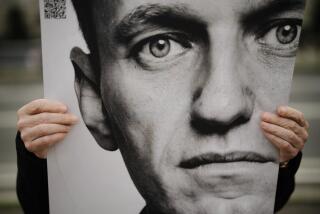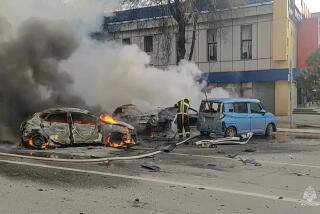Why Russians Are Indignant Over Kosovo
- Share via
MOSCOW — The national indignation in Russia about the bombing of Yugoslavia by NATO air forces is so strong that it is becoming an important factor in Russia’s foreign and domestic policy and it may influence the outcome of the conflict. What has produced this howl of rage, supported not only by all opposition politicians but also by pro-Western politicians?
I’m not talking here of geopolitical theories that circulate among politicians, diplomats, military strategists and analytical observers. They do not explain the behavior of ordinary Russians. Popular anger is aroused not by concepts, but by emotions. There are many reasons for their indignation but I will list only those that seem to me to be most important, taking into account Russian national consciousness, psychology, our historical traditions and our understanding of justice, honor and dishonor.
* The strong strike the weak, the many strike one. About 20 powerful countries, some of which are great military powers, with a combined population of more than 600 million people, are striking Serbia and also Montenegro, which is not in conflict with anyone. This spectacle is unacceptable to the Russian understanding of justice. The participation in this terrible action of Germany and Turkey, whose historical guilt before the Serbian people is far from forgotten, adds to the anger.
* The armed strike the unarmed. The Serbs do not have quantities of modern aviation or new forms of anti-aircraft defense. They are defenseless before NATO’s missiles and bombs. NATO pilots and sailors are beyond danger; they go unpunished. There are hundreds of dead and wounded on the Serbian side. Two have died on the NATO side. From the point of view of the Russian people this is an unequal and dishonorable, cowardly war. It isn’t even war, it is massacre.
* A Slav, Orthodox country is being destroyed. It was Russia that helped Serbia attain its independence in the 19th century. In all the European wars over the last 300 years, Serbia always has been Russia’s ally.
* Serbia is being beaten to humiliate and teach Russia a lesson. There is a strong conviction among Russians that the senseless destruction of Dresden in 1945 and the use of atomic bombs against Japan were demonstrations of strength to the U.S.S.R. above all. This is why the Serbian campaign is also often seen from this point of view.
Russia only began to rise from its knees in autumn 1998, to emerge from the crisis, to rid itself of worthless, alien politicians who were oriented to the West. The destruction of Serbia was conceived as a demonstration of the West’s strength and invincibility. It was intended to break Russia’s will, to put a stop to the integration process of Slav peoples. These ideas and feelings are particularly strong in the Russian army, in the defense industries and among veterans of the last war. But they are transferred to the entire population.
* The West deceived and robbed Russia. Our people were told over and over again about the benefits of democracy and the market economy, which the rich Western countries would help Russia construct. This illusion has long since disappeared. In the minds of the impoverished, there is a conviction that the West not only deceived us, but it robbed Russia, trying to turn it into the source of raw materials. Life in Russia became poorer, and the nation’s debts to the West grew several times over. Russia is being squeezed both out of international politics and also out of the international economy.
Although Russia is weakened, it is still strong. Its army may be hungry but it has great traditions. It is armed with modern weapons. Russia’s military-industrial potential is still very great. If ground forces and the neighboring countries are drawn into the war, Russia will certainly break the U.N. embargo on supplying arms to the Balkans, which is already being broken in relation to the Kosovo Liberation Army. A real union between Serbia, Belarus and Russia is not utopian.
Talk about the despotism of President Slobodan Milosevic does not impress the Russian citizens. Compared to our dictators, Milosevic seems a pragmatist. He was elected by the people. Serbia has a multi-party system and practically no political prisoners.
No one in Russia defends ethnic cleansing, but it is obvious to all that external aggression can only make it worse. In Russia, there are 3 million Russian refugees who have fled from the ethnic conflicts in Central Asia, Moldova, the Caucasus and Abkhazia. There are a million refugees in Azerbaijan, 500,000 in Armenia, 300,000 in Georgia. But no one thinks that bombs are the best means of returning their lost land to these people.
Serbia has lived in bondage for longer than it has been free. This small nation in the Balkans cannot be defeated; it can only be destroyed. If NATO does not intend to destroy it, it would be better to stop now, to prevent a more serious war with incalculable consequences.
More to Read
Sign up for Essential California
The most important California stories and recommendations in your inbox every morning.
You may occasionally receive promotional content from the Los Angeles Times.










